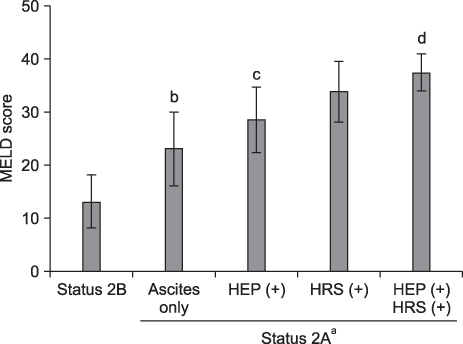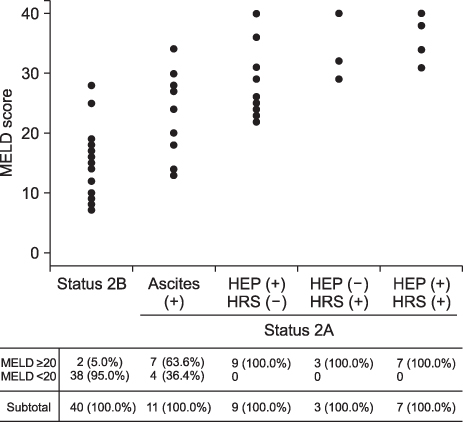J Korean Soc Transplant.
2012 Jun;26(2):112-119.
Severity of End-stage Liver Disease in Liver Transplant Candidate; Comparison of KONOS Status with MELD Score
- Affiliations
-
- 1Department of Surgery, Yonsei University College of Medicine, Seoul, Korea. ysms91@yuhs.ac
- 2Research Institute for Transplantation, Yonsei University College of Medicine, Seoul, Korea.
Abstract
- BACKGROUND
We have allocated liver according to the Korean Network Organ Sharing (KONOS) status. However, it was necessary to change the system to a more adequate and objective system. We analyzed the correlation between KONOS status and MELD score under the current status of organ allocation.
METHODS
We reviewed medical records of 70 liver recipients as KONOS status 2A and 2B between September 2005 and December 2010. We analyzed their KONOS status, MELD score, clinical characteristics, waiting time, Child-Turcotte-Pugh (CTP) score and clinical symptoms accorded to KONOS status 2A.
RESULTS
Mean MELD and CTP score of the 2A group was significantly higher than the 2B group (P<0.001). In the 2B group, the blood types of all recipients were identical to those of the donors. However, 2A group included 7 cases (23.3%) of non-identical blood types. The MELD score of all recipients were correlated with CTP score (R=0.798, P<0.001). However, there was an overlapping area between the 2B group and the 2A group that was registered by the condition of intractable ascites. Those who had hepatorenal syndrome and hepatic encephalopathy showed high MELD score over 20. However, 36.4% of the patients who had only intractable ascites showed a MELD score of less than 20.
CONCLUSIONS
CTP score was highly correlated with MELD score. However, KONOS status showed some overlapping area of the MELD score between 2A and 2B groups. We should make an effort to improve KONOS allocation system to meet the Korean situation.
Keyword
MeSH Terms
Figure
Reference
-
1. Korean Network for Organ Sharing (KONOS). 2010 Annual Data Report [Internet]. 2011. cited 2012 Apr 9. Seoul: KONOS;Available from: http://www.konos.go.kr.2. Gelder FV, Manyalich M, Costa AN, Paez G. 2009 International donation and transplantation activity. IRODaT preliminary data. Organs Tissues & Cells [Internet]. 2010. cited 2012 Feb 20. 1:5–8. Available from: http://www.europeantransplantcoordinators.org/uploads/pdfs/Irodat/01%20Irodat%202009.pdf.3. Kim MS, Kim SI, Kim YS. Current status of deceased donor organ recovery and sharing in Korea. J Korean Med Assoc. 2008. 51:685–691.
Article4. Wiesner RH, McDiarmid SV, Kamath PS, Edwards EB, Malinchoc M, Kremers WK, et al. MELD and PELD: application of survival models to liver allocation. Liver Transpl. 2001. 7:567–580.
Article5. Korean Network for Organ Sharing (KONOS). Regulations and guides of organ transplantation services [Internet]. 2009. cited 2012 Apr 9. 3. Seoul: KONOS;Available from: http://www.konos.go.kr.6. Gitlin N. Zakim D, Boyer TD, editors. Hepatic encephalopathy. Hepatology: a textbook of liver disease. 1996. 3rd ed. Philadephia: W.B. Saunders;605–617.7. Santori G, Andorno E, Morelli N, Antonucci A, Bottino G, Mondello R, et al. MELD score versus conventional UNOS status in predicting short-term mortality after liver transplantation. Transpl Int. 2005. 18:65–72.
Article8. Huo TI, Lin HC, Lee SD. Model for end-stage liver disease and organ allocation in liver transplantation: where are we and where should we go? J Chin Med Assoc. 2006. 69:193–198.
Article9. Lladó L, Figueras J, Memba R, Xiol X, Baliellas C, Vázquez S, et al. Is MELD really the definitive score for liver allocation? Liver Transpl. 2002. 8:795–798.
Article10. Korean Network for Organ Sharing (KONOS). An enforecement ordinance of law about organ or transplantation [Internet]. 2009. cited 2012 Apr 9. Seoul: KONOS;Available from: http://www.konos.go.kr.11. Organ Procurement and Transplantation Network (OPTN). Organ Distribution: Allocation of Livers. 2011. cited 2012 Mar 24. Richmond, Va: UNOS;Available from: http://optn.transplant.hrsa.gov.12. Davenport A, Cholongitas E, Xirouchakis E, Burroughs AK. Pitfalls in assessing renal function in patients with cirrhosis--potential inequity for access to treatment of hepatorenal failure and liver transplantation. Nephrol Dial Transplant. 2011. 26:2735–2742.
Article13. Cholongitas E, Germani G, Burroughs AK. Prioritization for liver transplantation. Nat Rev Gastroenterol Hepatol. 2010. 7:659–668.
Article14. Malinchoc M, Kamath PS, Gordon FD, Peine CJ, Rank J, ter Borg PC. A model to predict poor survival in patients undergoing transjugular intrahepatic portosystemic shunts. Hepatology. 2000. 31:864–871.
Article15. Edwards EB, Harper AM. The impact of MELD on OPTN liver allocation: preliminary results. Clin Transpl. 2002. 21–28.16. Freeman RB Jr. MELD/PELD: one year later. Transplant Proc. 2003. 35:2425–2427.
Article
- Full Text Links
- Actions
-
Cited
- CITED
-
- Close
- Share
- Similar articles
-
- Current Status of Deceased Donor Liver Transplantation for Alcoholic Liver Disease in Korea in MELD Era
- Mortality scoring systems for liver transplant recipients: before and after model for end-stage liver disease score
- Important predictor of mortality in patients with end-stage liver disease
- Prognostic impact of model for end-stage liver disease (MELD) scores greater than 40 in deceased donor liver transplant recipients
- Prognostic impact of model for end-stage liver disease scores greater than 40 in deceased donor liver transplant recipients




